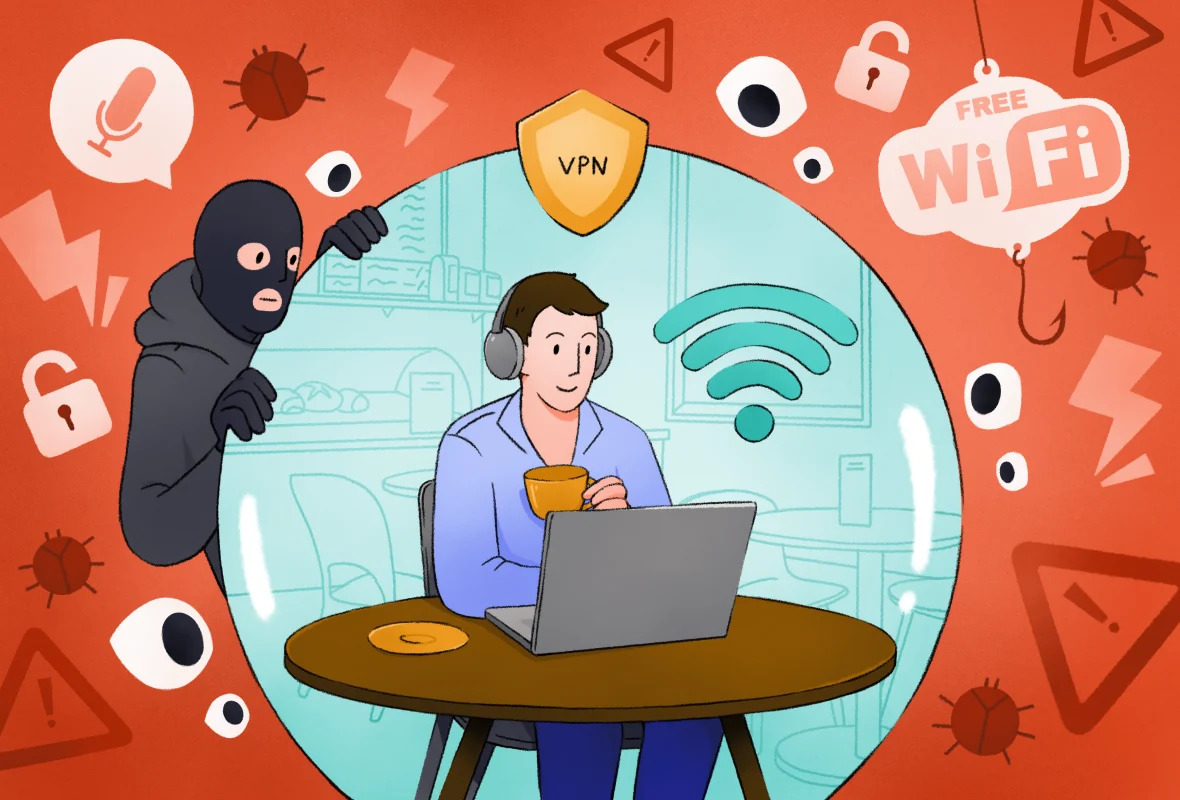Although HTTPS has made free WiFi hotspots a lot safer, VPNs can still protect you from man-in-the-middle attacks and other eavesdroppers.
Cybercriminals use unsecured public WiFi networks and network scanners to intercept your connection and steal any personal information you send over the internet, including device information, passwords, and credit card numbers.
Hackers might also create a spoof public WiFi network of the same name as a coffee shop or shop to fool users nearby into connection to their network.
Once you connect to this spoof network, this allows them to look at all network packets flowing through that network and even change your browser’s data endpoint to a server owned by the hacker.
If you then log in to a banking app or social media account while connected to the spoof network, your authentication details can be logged by the website and seen by the hacker.

A cybercriminal might use software such as LanScan to find low security devices on a public WiFi network to target.
As we’ve established, there’s an inherent level of risk with public WiFi networks and free hotspots, as they might be unsecured and vulnerable to these types of attack. However, you can protect yourself.
A VPN can enhance your online security and mitigate these risks by encrypting any transmitted data and masking your real IP address. By encrypting your data, VPN services also prevent the WiFi owner from seeing your internet activity.

Web traffic before and after connecting to a VPN with AES-256 encryption.
Unfortunately, VPNs aren’t guaranteed to protect you against malware and viruses. You’re still vulnerable to malware if you download it with a VPN connected, which is why we recommend using a combination of privacy and security tools to protect yourself online.
In addition, you can still get phished while connected to a VPN. If you open a suspicious link and enter your credit card information, even if you are connected to a VPN server, that information will still be transmitted to the cybercriminal who set that trap.
It’s absolutely worth investing in a VPN if you’re traveling a lot and using public WiFi often. Consider that cell phones are frequently connected to public WiFi networks in cafes, airports, hotels, and malls. These WiFi networks are typically unsecured and exposed to cyberattacks.
Is HTTPS Enough to Protect You on Public WiFi?
There’s an argument that people don’t need VPNs on public WiFi because the internet has become much safer with the introduction of HTTPS. While it’s true that HTTPS has ensured greater security online, HTTPS alone is not enough to make sure you’re secure when browsing on public WiFi.
HTTPS encryption online works between browsers and web servers, whereas a VPN encrypts all the data that leaves your device, even outside the browser in question.
This is especially important when using public WiFi on mobile devices, as you’re much more likely to use apps outside your online browser, and they might not rely on HTTPS encryption for transmitting data.
Is It Safe to Do Banking on Public WiFi With a VPN?
If you’re planning to do online banking on public WiFi, we strongly suggest you turn on a VPN before doing so. Using a VPN will add another layer of encryption to your traffic when opening banking apps or logging into online banking.
Ideally, you would only open your banking apps and websites in the safety of your home, where you control the WiFi network. Beyond complex hacking, someone might just look over your shoulder in a public place and see your bank details on your screen’s device.
Is a VPN Effective When Connected to a WiFi Network That Requires Authentication?
Some WiFi networks require you to sign in or enter an ID number, so that the network owner can keep records of who is using the network and for what purpose. Other public WiFi hotspots are paid services where you create an account and log in to access the internet.

We suggest using a temporary email address and an alias to connect to unfamiliar public WiFi hotspots.
The bad news is that these WiFi networks can use login details to track when you use the WiFi network. Using a VPN unfortunately won’t make these pop-up windows disappear.
However, if you want to keep your browsing history private, you can use a VPN to encrypt your web traffic, making it impossible for network providers to view your online activity. Once connected, the WiFi network provider will have no idea what website you’re visiting — though they will be able to see you’re using a VPN service.
































